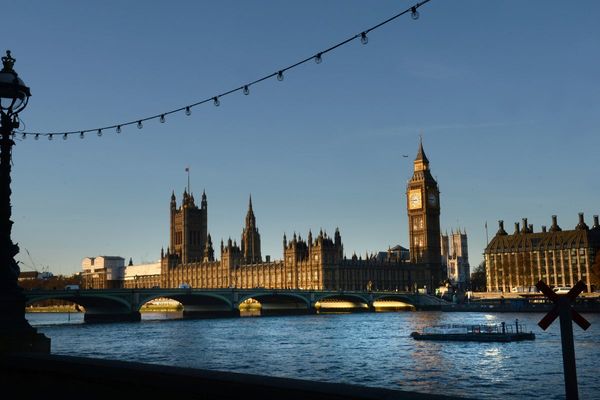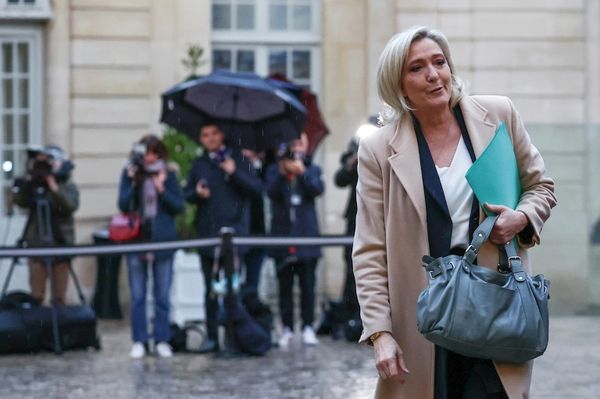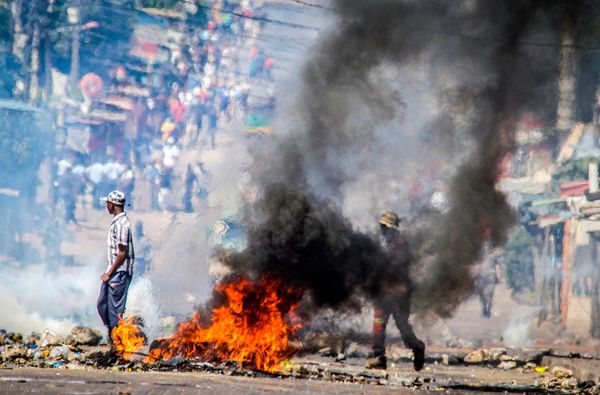Stocks finished lower Monday, while Treasury bond yields spiked and the dollar tested multi-decade highs against its global peers, as Federal Reserve Chairman Jerome Powell's inflation rhetoric rippled through global markets.
Powell's Friday speech at the Jackson Hole central banking symposium warned of the "pain" needed to tame the fastest inflation in more than forty years, and signaled further -- and possibly larger -- rate hikes to come between now and the end of December.
"Restoring price stability will take some time and requires using our tools forcefully to bring demand and supply into better balance," Powell said. "Reducing inflation is likely to require a sustained period of below-trend growth."
Powell's inflation reality-checked pushed U.S. stocks into one of their worst single-day declines on the year on Friday, snuffing out a solid six-week rally that had been predicted on bets for an easier rate path from the Fed.
Those bets have been largely erased in the wake of Powell's speech, however, as interest-rate sensitive 2-year Treasury note yields spiked to 3.47% in overnight trading, the highest since 2007, while the U.S. dollar index gained 0.52% against a basket of its global peers to trade a 109.372 and come within a whisker of the highest levels since 2002.
The CME Group's FedWatch, meanwhile, is pricing in a 65.5% chance of a 75 basis point rate hike from the Fed at it next policy meeting in September, up from just 55% a week ago and only 28% at the beginning of the month.
The Fed's renewed rate stance puts both Friday's jobs report, as well as the next inflation reading due on September 13, in sharp focus heading into what is historically the market's toughest month of the year.
The labor market has been the outperforming sector for the economy this summer, with 528,000 new positions added in July, taking the headline unemployment rate to a near five-decade low of 3.5%.
That growth rate is likely to slow sharply in August, however, with forecasters looking for a headline tally of 285,000 new jobs added to the world's biggest economy.
Wages, however, are likely to rise as more than 11 million open positions remain unfilled, and that could test the market's complacency with respect to slowing consumer price pressures.
Economists are looking for average hourly earnings to rise 5.3% from last year, and 0.4% from July.
Central banks around the world, apart from the People's Bank of China, are also echoing Powell's hawkish stance, with the European Central Bank's Francois Villeroy de Galhau calling for a "significant" rate hike in September even as the region's economy flirts with both a looming energy crisis and the potential for recession.
Recession in Britain is also a growing risk, according to economists at Goldman Sachs, who called for a contraction to begin over the final three months of the year and extended into most of 2023 amid a surge in home energy costs that will hammer discretionary spending and potentially lead into a consumer debt crisis.
The gloomy backdrop for stocks heading into the final week of August trading has markets on the back foot, with Europe's Stoxx 600 marked 0.81% lower by the close of Frankfurt trading, following on from a 1.85% tumble for the MSCI ex-Japan index in Asia and a 2.66% decline for the Nikkei 225 in Tokyo.
On Wall Street, the S&P 500 finished down 0.67%, while the Dow Jones Industrial Average fell 180 points, 0.57%, to 32,089. The tech-focused Nasdaq lost 1.02%.
In other markets, Global oil prices jumped higher Monday, rising in the face of both a soaring U.S. dollar and fading growth prospects in the world's biggest economies, amid ongoing concerns over OPEC production cuts.
Saudi Arabia, the cartel's most influential member, has hinted at output cuts amid what its energy minister has described as 'chaotic' global markets and the impending supply addition of Iranian crude, which could hit markets in the coming months if talks between the US, the EU and Tehran over the future of its nuclear program continue to move forward.
Deadly unrest in Libya over the weekend, a key OPEC state in terms of supply, added to concerns over near-term disruptions that could keep prices elevated.
WTI crude futures for October delivery were marked $3.85 higher at $96.91 per barrel while Brent contracts for the same month, the global pricing benchmark, gained $3.86 to trade at $104.85 per barrel.
Bitcoin prices slumped back under the $20,000 mark Monday following the ongoing dollar rally the spike higher in Treasury yields, both of which added downward pressure on assets such as gold and digital coins, which don't pay their investors interest.
Bearish sentiment was also linked to reports that creditors owing debts from the 2014 collapse of the Mt. Gox crypto exchange will begin to receive payments from administrators in Japan, a move that could see 137,000 new bitcoin added to the market -- and possible sold -- over the coming weeks.
Bitcoin prices were last seen trading slightly higher on the Monday session at $20,115.43 each.







